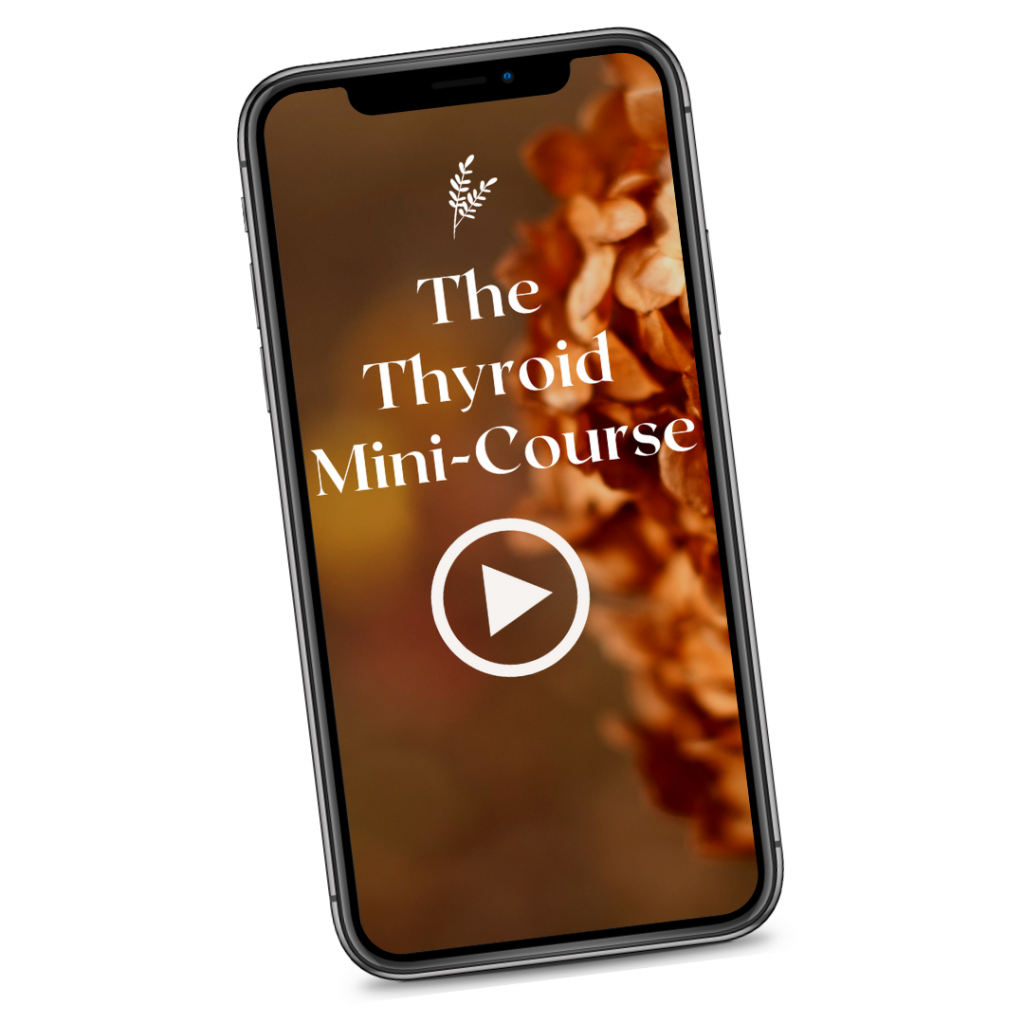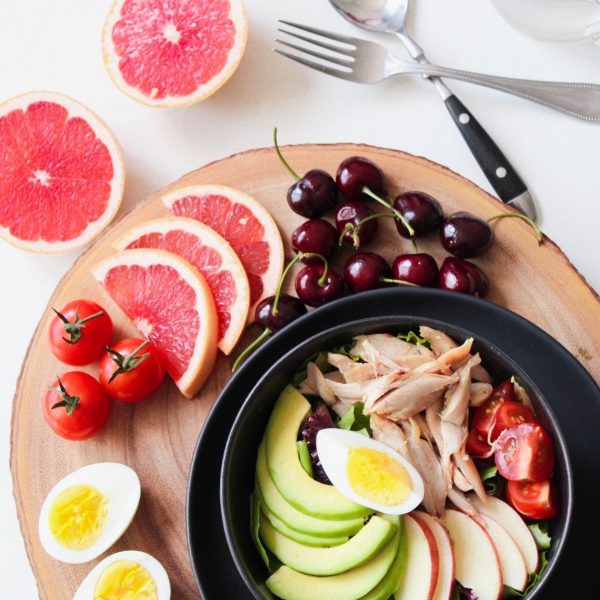Did you know there are certain fertility foods that nourish the thyroid gland and boost its health? First of all, it’s important to recognize that there is a strong relationship between thyroid health and your fertility! This is true for both men and women. Your thyroid gland is a small gland in the front of your neck that does great things for your body. It makes two types of thyroid hormones that are important for the metabolism of every single cell in your body. If the thyroid gland is underactive (in hypothyroidism), there isn’t enough thyroid hormone and the processes of the entire body become sluggish. If the thyroid gland becomes overactive (in hyperthyroidism), cells go into overdrive which isn’t healthy for you either.
What Causes Thyroid Disease?
Most cases of overactive and underactive thyroid function happen because of autoimmune disease. This is where your body’s immune cells make antibodies that can activate or deactivate the thyroid gland. A few cases of hypothyroidism can be related to not getting enough iodine in your diet. Iodine is an important chemical element for thyroid (and ovarian) function. In the same way, a few cases of hyperthyroidism can be related to having too much iodine in your body—mostly caused by taking excessive numbers of iodine supplements.
Your Thyroid Gland and Fertility
Both an underactive and overactive thyroid gland can affect fertility for both women and men:
- Women with hypothyroidism have an impaired ability to release an egg each cycle; that is, they don’t ovulate enough. This can greatly impair fertility. Hypothyroid women who get pregnant have an increased risk of miscarriages and other pregnancy complications. Women with hyperthyroidism, on the other hand, can have lighter and more irregular periods.
- Men with hypothyroidism can have erectile dysfunction, impaired libido, and poor sperm quality. Hyperthyroidism in men leads to low sperm count and reduced fertility.

Learn How To Support Your Thyroid Naturally With My Thyroid Mini-Course
- Learn how to support your thyroid naturally with nutrition, supplements and plants.
- Know how to tell whether your thyroid, endocrine system or/and adrenals needs support
- Self-care therapies to support your thyroid and endocrine system
Supporting thyroid health
It is imperative to have hypothyroidism and hyperthyroidism treated if you are trying to conceive, as these two problems can easily be the source of your infertility. The treatment can involve replacing the missing thyroid hormones or suppressing an overactive thyroid gland. There is no diet or food that can totally replace taking the medications you have been prescribed for these problems. On the other hand, if you haven’t been officially diagnosed with a thyroid condition but want to support your thyroid gland (or if you want to add foods to your medication regimen for thyroid disease), there is a lot you can do.
Fertility-friendly Foods for Thyroid Health
Most foods for enhancing thyroid function are good for your fertility as well. There are specific foods you can eat to boost low thyroid function and foods you can eat to help level elevated thyroid function.
Hypothyroid:
Foods to enhance the ability of the thyroid to function that would be good for hypothyroidism or “low thyroid function” according to Registered Dietician Ryan Raman MS in Nutrition and Dietetics from the University of Auckland include the following:
- Iodized salt
- Seafood (these can be high in iodine, which is essential for thyroid health) and shellfish
- Seaweed (this is a vegan way of getting iodine in your diet)
- Dairy (cheese or milk) – always choose grass-fed, organic or raw dairy
- Pasture-raised or cage-free eggs (these are high in iodine)
- Sea vegetables (these are especially high in thyroid-boosting iodine)
- Brazil nuts (these are high in selenium, which helps to make active thyroid hormone)
- Maca (Lepidium meyenii)(this supports the hypothalamus and pituitary gland, which are important in thyroid health)
Hyperthyroid:
Foods to manage hyperthyroidism or “elevated thyroid function” include the following according to Endocrinologist Daesman N. Suri MD of the Academic Endocrinology and Metabolism and Dana James Triple Board Certified Functional Nutritionist:
- Dairy (cheese or milk) – always choose grass-fed, organic or raw dairy
- Turkey (a good source of protein for the weight loss that accompanies hyperthyroidism)
- Salmon (this is high in vitamin D to support bone health)
- Cruciferous vegetables (these include broccoli, kale, cauliflower, cabbage, and Brussels sprouts)
- Berries (these are high in antioxidants that help your immune system) – always choose organic
- Ginger, Basil, Rosemary and Oregano (these are anti-inflammatory herbs for thyroid health)
- Bone broth (this can detoxify the body and can diminish a leaky gut)
Foods to avoid:
- Gluten can activate autoimmune processes that are important in the development of thyroid diseases (both low thyroid and high thyroid conditions).
- Sugar and artificial dyes can also lead to autoimmunity.
- Processed and GMO foods should also be avoided as these are not good foods for fertility or for autoimmune conditions.
My final thoughts…
You should always be thinking about supporting your thyroid health because your thyroid gland is linked to ovulation in women and fertility in both men and women. If you have known thyroid problems, work with your healthcare provider in order to take the right medication, if necessary. At the same time, let your diet also help you out! Depending on what you eat, your diet can activate or suppress your thyroid gland. Be reminded to avoid foods in the diet that can activate autoimmunity, which is the main cause of thyroid diseases.
Click here to learn more about a nutritional and herbal supplement for thyroid health…
Additional reading:
Every Woman’s Guide to Hypothyroidism and Fertility
Thyroid Health for Men – How Thyroid Problems Affect Male Fertility
How Hashimoto’s Thyroiditis Affects Fertility
Fertility Q&A: Fertility Diet Tips for Thyroid Health
The Benefits of Bone Broth as Part of a Fertility Diet
- Causes of thyroid problems. (Last reviewed: November 2018). Retrieved from: https://www.healthdirect.gov.au/causes-of-thyroid-problems
- Thyroid Disease and Infertility. (n.d.) Tennessee Fertility Institute. Retrieved from: http://tnfertility.com/2016/11/thyroid-disease-and-infertility/
- Pregnancy and hyperthyroidism. (Revised 2018). British Thyroid Foundation. Retrieved from: http://www.btf-thyroid.org/information/leaflets/38-pregnancy-and-fertility-guide
- Raman, R. (November 1, 2017). Best Diet for Hypothyroidism: Foods to Eat, Foods to Avoid. Retrieved from: https://www.healthline.com/nutrition/hypothyroidism-diet
- James, D. (n.d.). What You Should Eat To Improve Thyroid Health. Retrieved from: https://www.mindbodygreen.com/0-10681/what-you-should-eat-to-improve-thyroid-health.html
- Suri, D.N. (n.d.). 5 Foods that May Help Ease Hyperthyroidism Symptoms. Retrieved from: https://www.endocrineweb.com/conditions/hyperthyroidism/5-foods-may-help-ease-hyperthyroidism-symptoms
- Axw, J. (June 23, 2014). 5 Ways to Treat Hyperthyroidism Naturally. Retrieved from: https://draxe.com/5-ways-treat-hyperthyroidism-naturally/





